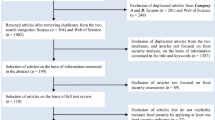Abstract
We conducted a cross-sectional study among 188 tribal children aged 6–59 months using two-stage sampling in Bankura-I Block of Bankura district, West Bengal, India, to assess their nutritional status and its relation with household food security. Weight and height/length were measured and analyzed as per new WHO Growth Standards. Mothers of the study children were interviewed to obtain relevant information. Prevalence of Composite Index of Anthropometric Failure was 69.1% and multiple anthropometric failures were more likely among tribal children aged 24-59 months with irregular utilization of supplementary nutrition and from households with severe grades of food security.
Similar content being viewed by others
References
Saha KK, Frongillo EA, Alam DS, Arifeen SE, Persson LA, Rasmussen KM. Household food security is associated with growth of infants and young children in rural Bangladesh. Public Health Nutr. 2009;12:1556–1562.
Hackett M, Quinonez HM, Alvarez MC. Household food security associated with stunting and underweight among preschool children in Antioquia, Colombia. Pan Am J Public Health. 2009;26:506–510.
Indian Institute of Population Sciences and ORC Macro. National Family Health Survey (NFHS-2), 1998–99. Mumbai, India: IIPS; 2000.
International Institute for Population Sciences (IIPS) and Macro International. National Family Health Survey (NFHS-3), 2005–06: India: Volume-1. Mumbai, India: IIPS; 2007.
Svedberg P. Poverty and Undernutrition: Theory, Measurement and Policy. New Delhi: Oxford India-Paperbacks; 2000.
Nandy S, Irving M, Subramanian SV, Smith GD. Poverty, child undernutrition and morbidity: new evidence from India. Bull World Health Organ. 2005;83:210–216.
Mukhopadhyay DK, Biswas R, Sadhukhan S, Chakraborty M, Banik KK. Anthropometric failure, a new approach to measure undernutrition: An experience from a rural community of West Bengal, India. J Indian Med Assoc. 2009;107:211–215.
U.S. Food Security and Survey Module: Six-Item Short Form. Economic Research Service. United States Department of Agriculture. 2008. Available from: URL: http://www.ers.usda.gov/Briefing/FoodSSecurity/surveytools/short2008.pdf. Accessed June 2, 2009.
World Health Organization. Physical Status: The Use and Interpretation of Anthropometry: Report of WHO Expert Committee. WHO Tech Rep Series-854. Geneva: WHO; 1995.
WHO Anthro 2005, Beta version Feb 17th, 2006: Software for assessing growth and development of the world’s children. Geneva: WHO, 2006. Available from: URL: http://www.who.int/childgrowth/software/en/. Accessed June 2, 2007.
Seetharaman N, Chacko TV, Shankar SLR, Mathew AC. Measuring malnutrition-the role of Z scores and the composite index of anthropometric failure (CIAF). Indian J Community Med. 2007;32:35–39.
Yadav RJ, Singh P. Nutritional status and dietary intake in tribal children in Bihar. Indian Pediatrics. 1999;36:37–42.
Rao DH, Rao KM, Radhaiah G, Rao NP. Nutritional status of tribal preschool children in three ecological zones of Madhya Pradesh. Indian Pediatr. 1994;31:635–640.
Baig-Ansari N, Rahbar MH, Bhutta ZA, Badruddin SH. Child’s gender and household food insecurity are associated with stunting among young Pakistani children residing in urban squatter settlements. Food Nutr Bull. 2006;27:114–127.
Author information
Authors and Affiliations
Corresponding author
Rights and permissions
About this article
Cite this article
Mukhopadhyay, D.K., Biswas, A.B. Food security and anthropometric failure among tribal children in Bankura, West Bengal. Indian Pediatr 48, 311–314 (2011). https://doi.org/10.1007/s13312-011-0057-2
Received:
Revised:
Accepted:
Published:
Issue Date:
DOI: https://doi.org/10.1007/s13312-011-0057-2




